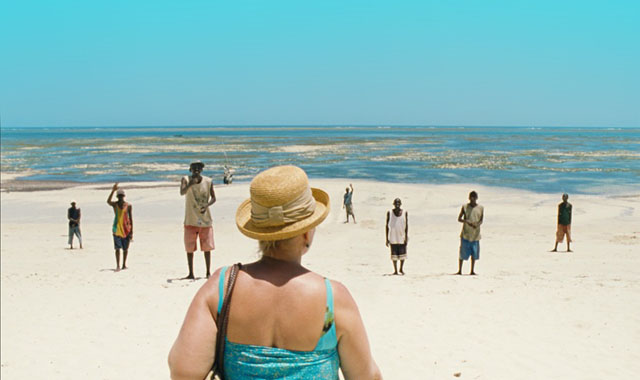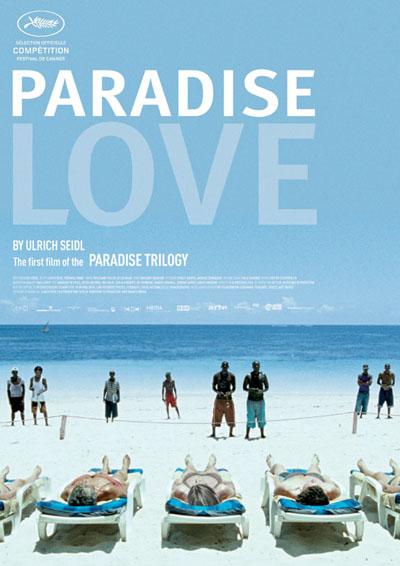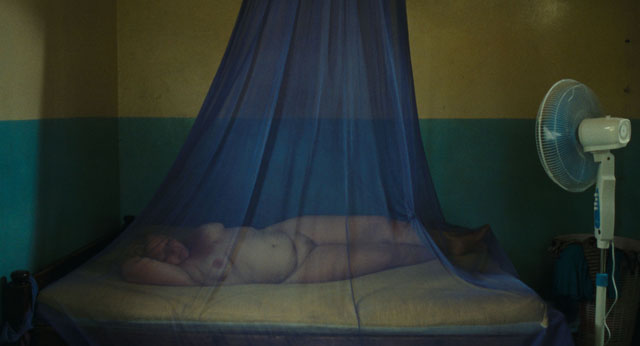As Anna Tatarska wrote here in Keyframe yesterday, “Since the time [Ulrich] Seidl started studying film in his mid-twenties, he hasn’t stopped raising controversy, first among his professors, later with film critics and the public. He enters competition at the Cannes International Film Festival with another film sure to raise dissent: Paradies: Liebe [Paradise: Love], a film about European sex tourism in Kenya—with women doing the buying.” It’s the first of a projected trilogy, to be followed by Paradise: Faith and Paradise: Hope, with each film following a different woman from the same family as they strike out to find happiness.
The Guardian‘s Peter Bradshaw: “Margarethe Tiesel plays divorcee Teresa, who packs her truculent teen daughter off to weight-loss camp (the daughter’s story is to be told in one of the other two films) before heading off to Kenya where a friend has assured her that delicious sex is hers for the taking. Soon she meets Munga (Peter Kazungu) and for a while, things proceed satisfactorily: Teresa even believes he doesn’t want money. Of course, the situation is every bit as degrading and humiliating for all parties as you might expect.”
Seidl “is noted for a particular brand of ‘staged reality’—documentaries styled like fiction, and ostensible fiction features in which amateur actors and professionals seamlessly interact in dramas with ‘real’ elements, or maybe vice-versa.” The LA Weekly‘s Karina Longworth: “Given that the white ladies are all played by actresses with substantial IMDB profiles and the black actors are all apparent first-timers, one wonders how closely the production mirrored the queasy, exploitative economics depicted in the film. It would be totally fitting with Seidl’s apparent project if Paradise (Love) was, in some sense, a documentary of its own making. But that doesn’t make its facile ironies about still-pervasive, post-colonial exploitation and dehumanization any more enlightening.”
“When the director crudely films a real beach boy being used by actresses during a long birthday scene, some could accuse him of a form of abuse, of the same excess that morality would have required him to denounce more clearly,” writes Domenico La Porta at Cineuropa. “But Seidl doesn’t share this opinion: ‘In Kenya, whether you want it or not, everything is about money. A white European is considered to have money and is treated in consequence.’ Often, the director’s point of view stays on one side of the rope that divides tourists from locals on the film’s Kenyan beaches. This is probably, in itself, a way of denouncing the tourists’ simplistic viewpoint. ‘There Europe, here Africa,’ calls out an African on the other side of the rope, but already it is dishonest, because even when the film advances more into the daily lives of these small-time gigolos, their scams, and only their scams, are shown to us.”
For Guy Lodge, writing for Time Out London, “Paradise: Love amounts to a witty if psychologically pitiless test of our unspoken presumptions about age, race, class and gender, lingering on the kind of physiques and interactions that Hollywood has long taught us are not fit for general consumption, and calmly inviting us to ask ourselves why we want to look away from the screen when we do…. At 120 minutes, the director perhaps luxuriates in our discomfort a little too long, but it’s still a relief to be on our side of the screen.”
“Repulsive and sublimely beautiful, arguably celebratory and damning of its characters, it’s hideous and masterful all at once, Salò with sunburn,” suggests Leslie Felperin in Variety. The Hollywood Reporter‘s David Rooney: “Superficially provocative but ultimately pointless, this is one punishing vacation.” Screen‘s Allan Hunter: “Seidl remains an impressive visual stylist and is also able to create a film with a balanced view of how sex tourism creates a sense of exploitation on both sides of the divide albeit one born from very different forms of desperation.”
Updates: “Despite accusations of empty provocation often leveled against Seidl, there’s more going on here than just shock tactics,” argues Budd Wilkins at the House Next Door. “Seidl’s early films were all documentaries, albeit ones that, like Seidl admirer Werner Herzog’s, contain almost equal measures fiction and nonfiction. Furthermore, Teresa’s character is drawn with some nuance. Though, truth be told, hers is the only character that’s treated as more than a caricature. And then there are Paradise: Love‘s many technical virtues. The cinematography, by longtime Seidl collaborator Wolfgang Thaler, in tandem with Ed Lachman, is particularly fine.”
“It is an excitable filmmaking, one suffuse with its enjoyment of delivering discovery,” writes Daniel Kasman in MUBI’s Notebook. “It is Seidl’s filmmaking, not the story, that constitutes the discovery, the presentation of spaces, real but framed wholly, with geometric precision, as if parceled out, each an element unto itself with its own key observations: the symmetry of sunbathers, the line in the sand dividing a resort from the local population, an apartment into rooms, the intrusion of live monkeys into a staged shot, the deep purple of Kenyan twilight (captured in 35mm), the image of a sleeping odalisque, seen above, of the supposedly ugly, overweight and old Austrian tourist instead a thing of extreme beauty. All is as if the world is a whole and contiguous (as we see how one parcel leads to another) but each also a thing, discoverable, containable, remarkable and fact-filled, situation and location based, textured by color, geometry, light.”
“Seidl gives every shot a meticulous sense of balance, making the graphic imagery and scathing subtext all the more disturbing when juxtaposed with the beautiful beach setting,” notes Glenn Heath Jr. at the L.
“Unrelated to the rest of the film but emotionally logical, Seidl’s reshoots the gleeful bumper car blitz from Bresson’s Mouchette, but with all of the drivers played by mentally handicapped adults,” notes Blake Williams at Ioncinema. “It’s a visceral yet totally isolated event, not at all outside of the world we’ve come to expect from this Austrian auteur. It’s worth mentioning it, though, because what comes in the following two hours is far more ordinary, comprehensible, and politically weighted. Unfortunately, as a two hour 1st act of what was originally intended to be a 5-hour colossus with all of the trilogy’s strands, this colonialist fairytale’s central idea feels distended to the point of exhaustion and viewer indifference.”
“Ultimately, Paradise: Love seems interested only in making you wince, not in making you think,” finds Mike D’Angelo at the AV Club. David Jenkins for Little White Lies: “Seidl, who was in the Cannes competition in 2007 with his similarly close-to-the-bone Import/Export, is not so much a director who likes to prod open wounds as one who likes to tear at them with a claw hammer.” Michal Oleszczyk at Hammer to Nail: “Technically, the movie is very accomplished, with every set piece perfectly timed and every composition making some kind of satirical point. What is lacking is any sense of directorial resolve—Seidl wants to have his cake and eat it too; to both hate his characters and make us feel sorry for their desperate loneliness. When the lights go up, one feels like one’s conscience has just been violated, not enriched.”
Time Out New York‘s David Fear disagrees: “Once you dig past the anticolonial tirade on Paradise: Love‘s surface, the importance of that second word becomes apparent. Teresa acts horribly to her lovers and they act horribly toward her, but whereas these African men seem to have reluctantly reconciled the toll these transactions enact on both sides, she can’t, or won’t, acknowledge anything past her hope for a real connection. Seidl’s sniggering ugliness eventually gives way to a profound sadness that left a lot of the press corps staring morosely into their postscreening drinks. I can’t wait to recommend that people see this, even if I can’t ever bring myself to watch it again.”
In Cannes, reports Brian Clark at Twitch, and for now, in sum, “the audience seemed split between vehement disgust and fervent praise.”
Updates, 5/24: Dennis Lim interviews Seidl for the New York Times and Scott Foundas introduces his own talk with Seidl for the Film Society of Lincoln Center: “Paradise: Love strikes me as his boldest and most ambitious work to date—a confrontational yet oddly compassionate meditation on the residual chasm between Europe and its former colonies, profound loneliness in the so-called communication age, and the infinite varieties of the human body. On Saturday afternoon, I sat down with Seidl to talk about the film, its detractors, and its unusual evolution from a single project into a trilogy.”
Paradise: Love is “Seidl at his most unexpectedly emotional,” finds Robert Koehler at Film Journey. The film “attacks less an enchanting paradise than a fascinating paradox: Feminist Colonialism, or, if you wish, Colonialist Feminism.” But for Melissa Anderson, writing for Artforum, Seidl, “an equal-opportunity misanthrope known for documentary-fiction hybrids that he has likened to ‘staged reality,’ explores the not especially original question of who is exploiting whom.” Adds Time Out Chicago‘s Ben Kenigsberg, “while it’s arguably a dark comedy, the movie has an off-putting smugness—as if Seidl thinks he’s somehow acknowledging heretofore undiscovered social realities, rather than stacking the deck in an attempt to win an argument with himself.”
Cannes 2012 Index: a guide to the coverage of the coverage. For news and tips throughout the day every day, follow @KeyframeDaily on Twitter and/or the RSS feed.






